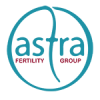Ovarian hyperstimulation can occur as a result of receiving injectable fertility drugs. It can occur in up to 5% of cases, particularly if the patient has polycystic ovary syndrome. In OHSS, there is excessive ovarian enlargement due to an excessive number of growing follicles turned on at the same time. Bloating and a cramping sensation are common. The severe form is accompanied by excessive amounts of fluids leaking into the abdominal and thoracic cavity, leading to a decrease in blood volume, an increase in blood concentration, and thus, an increased risk of clot formation. There is also a risk of renal impairment and a decline in kidney function. In OHS, there is a concomitant increase in abdominal fluid distension (ascites) and increasing difficulty breathing.
The condition cannot occur without receiving the ovulation triggers.eOvidrel or HCG. The early-onset form occurs a few days after the ovulation trigger. The delayed onset form occurs after implantation is established and is due to a gradual rise in the pregnancy hormone HCG. The severity of the symptoms is unpredictable, but generally speaking, the condition is self-limited, and treatment is supportive, ensuring good hydration, controlling discomfort, combating nausea, and occasionally drainage of excessive abdominal and thoracic cavity fluid.
The severity of the symptoms is unpredictable, but generally speaking, the condition is self-limited and treatment is supportive, ensuring good hydration, controlling discomfort, combating nausea, and occasionally drainage of excessive abdominal and thoracic fluid.


